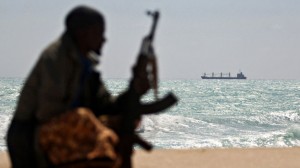A bad problem grows worse: ransom money moves abroad as pirates and Islamists jostle for influence.

Members of Hizbul Islam took over the Somali town of Haradhere earlier this week, pushing out the town’s previous pirate rulers. Everything happened without a shot being fired: the pirates gathered their TVs and trucks and simply moved north to another safe haven, the town of Hobyo. They took at least four hijacked ships with them.
This is an interesting development in the relationships between pirate and Islamist groups along Somalia’s lawless coast. Hizbul Islam’s head of operations Sheik Mohamed Abdi Aros told Associated Press journalists that his group views piracy as un-Islamic and has come to Haradhere to install sharia law. All hostages and ships discovered by Hizbul Islam would be released.
The pirating industry in Somalia is a lucrative business, generating over $90m in ransom money last year. A lot of those funds are finding their way to Kenya, where corrupt officials and border guards allow the pirates to funnel money into real estate and other legitimate business sectors. Nairobi’s Eastleigh neighborhood has become the Kenyan center for Somalian pirates. This does not bode well for the fight against government corruption in the region, or for the quest to establish a stable government in Somalia. Well-connected and extremely wealthy pirate leaders might grow to wield significant influence in Kenyan and regional politics.
At present, it appears that the pirates are unwilling to fight the fundamental Islamist movements like Hizbul Islam. They are certainly equipped to do so, with one resident saying a pirate leader with sixty machine guns still moved out of the way. However, things might not always be this way. The Taliban in Afghanistan did an amazing job eradicating the poppy industry in the 1990s, but towards the end of their reign in Kabul and also during the present insurgency, Taliban leaders have struck lucrative partnerships with regional drug lords. Islamic ideals can change depending on practical interests. Somali Islamists currently view the pirating industry as dirty and un-Islamic, but future collaboration would create major problems for the international community and shipping companies. Ransom money would likely end up in the hands of terrorist organizations in Africa and elsewhere.
So, what to do about lawless Somalia? The major pirate leaders are presiding over a multi-million dollar industry and expanding their influence to other African countries. Ransom money continues to flow in despite some protection of international shipping routes by American and regional navies. Corruption is a serious problem in Kenya and an influx of ransom money is making it worse. Good governance in both Kenya and Somalia is unlikely in the near future, and it is only a matter of time before violent groups like Hizbul Islam and al-Shabab begin collaborating with the pirates. By then, ransom money paid by international shipping groups might start buying weapons for terrorists as far away as Pakistan.
photo courtesy of NPR.
Further reading:
http://news.yahoo.com/s/ap/20100503/ap_on_re_af/piracy
http://www.npr.org/templates/story/story.php?storyId=126510891